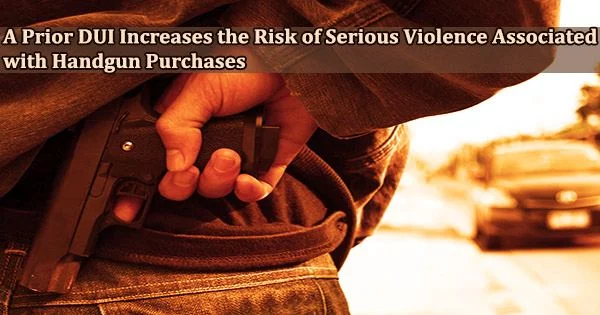A UC Davis Violence Prevention Program (VPRP) study found that people who legally purchase handguns and have had a prior DUI conviction run a higher risk of being arrested in the future for a violent crime such as murder, rape, robbery, or aggravated assault as well as for violent crimes involving firearms.
The study publishes in the Sept. 30 issue of JAMA Internal Medicine.
“Alcohol use is a well-established risk factor for firearm violence,” said Rose Kagawa, assistant professor of emergency medicine and first author of the VPRP study. “Our study suggests that handgun purchasers with a DUI conviction on their record at the time of purchase have a higher incidence of future violence and crime compared to purchasers without DUI convictions.”
The California Department of Justice Dealer’s Record of Sale database was used by the VPRP team to locate every person aged 21 to 49 who legally bought a weapon in California in 2001. The age range takes into account the legal minimum age in California for purchasing handguns, as well as the reality that crime rates among those 50 and older are generally low.
When we compared purchasers who only had DUI convictions and no other arrests or convictions with those who had no criminal history, a DUI conviction was associated with more than double the risk of future arrest for a violent crime.
Rose Kagawa
Using records from the California Department of Justice Criminal History Information System, they identified arrests for violent crimes following the first purchase in 2001 (+10 days to account for California’s waiting period) until the end of 2013 or until they could no longer confirm the purchaser was alive and residing in California. At the time of purchase, people having at least one DUI conviction on their record were contrasted with those without.
“Of the 78,878 handgun purchasers in California whose criminal records we tracked during 13 years, 9% of purchasers with pre-existing DUI convictions were later arrested for murder, rape, robbery or aggravated assault. This is compared to 2% of purchasers with no prior criminal history at the time of purchase,” Kagawa said.
“When we compared purchasers who only had DUI convictions and no other arrests or convictions with those who had no criminal history, a DUI conviction was associated with more than double the risk of future arrest for a violent crime.”
According to California law, anyone convicted of some severe crimes cannot legally purchase a pistol within ten years of their sentence. They were therefore excluded from the study.
The research builds on VPRP research from 2018 that tracked arrests for violent or firearm-related offenses from 1977 to 1991 using data on handgun purchases. Even though there were only 4,066 participants in the sample, the study found a link between arrests for future violent crimes and risky alcohol usage, particularly DUI charges.













